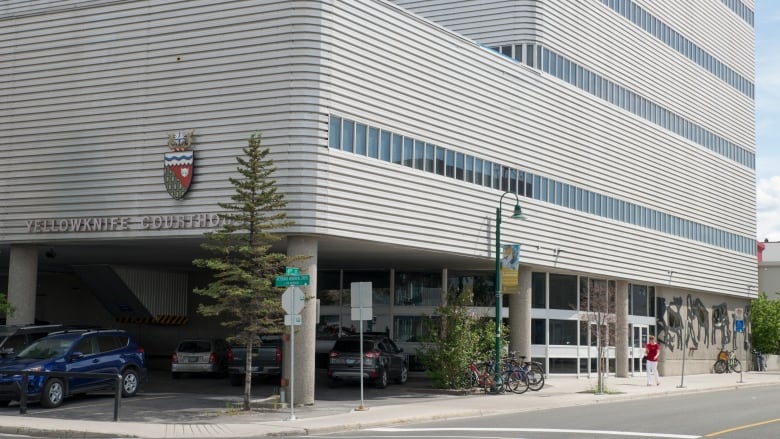Lawyers in Yellowknife, Northern Canada push back at courthouse bail hearing ban

Criminal defence lawyers have gone to court to fight an “unwritten policy” recently enacted by Justices of the Peace in Yellowknife, in Canada’s Northwest Territories.
According to affidavits filed by the lawyers, last month the justices told defence lawyers that men accused of crimes will no longer be able to come to court for their bail hearings. Unless “exceptional circumstances” require it, all male prisoners would have to appear by video from the North Slave Correctional Centre.
“The defence bar in general has concerns about the quality of the hearing that’s being conducted when your clients are being held at the jail and taking part by video,” said lawyer Charles Davison. “They’re just not getting the proper quality of hearing that would be the case if they were present in the courtroom with us.”
Davison and other lawyers said that reduction in quality is caused by things such as breaks in the video and/or sound connection to the jail and the inability for lawyers in court to speak privately to clients appearing by video.
Lawyers who choose to be with their clients at the jail instead of in the courtroom during bail hearings have no opportunity to gauge reaction of Justices of the Peace to crown arguments and cannot see any documents submitted as evidence. The have also had problems hearing people who agree to be sureties when they are testifying by phone.
In one case, according to an affidavit filed in the case, the sound from the court to the jail cut out just as the Justice of the Peace was giving her decision, so the lawyer, who was with her client at the jail, did not know whether he had been released or not.
Change to accommodate renovation
In addition to bail hearings, Justices of the Peace preside over less serious criminal matters, such as traffic violations. They also have the authority to issue search warrants. They are typically lay people, not law school graduates.
Though there was no mention of the rule being temporary, it was apparently introduced because renovations of the holding cells at the courthouse are taking longer than expected and causing difficulties handling prisoners appearing in court.
There is no video link to the courthouse from the young offenders’ facility. Davison said he understands that corrections is unable to bring women temporarily housed at the North Slave Correctional Centre to the room where male prisoners are taken for video appearances.
According to a transcript, at a June 12 bail hearing for one of Davison’s clients, Justice of the Peace Greg Merrithew told Davison, the change was the result of “challenges that we have now with having construction within the courthouse. It is causing difficulties to have too many individuals in the courthouse at any one time.”
Merrithew cited Sec. 515 (2.2) of the Criminal Code, suggesting it gives judges the authority to order male offenders to have bail hearings by video only. Davison said that section of the Code says the opposite, that offenders “shall” appear in court for their bail hearings.
Davison initiated an application to prevent the Justices of the Peace from implementing the “unwritten policy.” At an appearance in court on Monday, he said he is optimistic the case will be resolved before a full hearing will be necessary.
He said a bail working group that includes the chief judge, Justices of the Peace, sheriffs, corrections officials and RCMP has been established to work out how bail hearings will be handled during the renovation.
Concerns about judicial independence
There’s evidence the Justices of the Peace are simply following orders from the government.
Davison says that raises concerns about a fundamental principle of democracy, the separation of the powers of government and the powers of the courts.
At the June 12 bail hearing, Merrithew said the Justices of the Peace had been “advised by Court Services of the challenges” posed by the courthouse renovation. Court Services is a branch of the territorial Department of Justice.
In an affidavit, another defence lawyer said she was told informally by Justice of the Peace Adelle Guigon that the change was made after speaking with “someone upstairs.” The Yellowknife courthouse consists of the lower three floors of a leased six storey building. The top three are occupied by the Department of Justice.
Davison points out that the change was introduced in a way that is contrary to the way courts normally work — there was no notice to defence lawyers or their clients, or any opportunity for them to speak about it.
“So that gave rise to concerns about their independence,” said Davison of the Justices of the Peace. “They’re supposed to be independent just as any other judge is supposed to be independent. They’re supposed to make their decisions in accordance with the law and make their decisions after hearing submissions from parties if there are interested parties.”
An official with the justice department says no one will be commenting on the issue because the matter is before the courts.
Related stories from around the North:
Canada: Judge rules three-year mandatory minimum ‘abhorrent and intolerable’ in Canada’s east-Arctic, CBC News
Finland: Recruiter in Finland accused of discriminating against Russian-Finnish dual citizen freed by court, Yle News
United States: Could Alaska’s rural Indigenous communities fight violence with broader law enforcement powers?, Alaska Public Media



